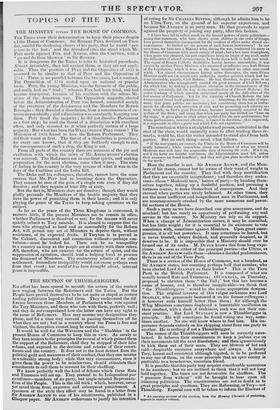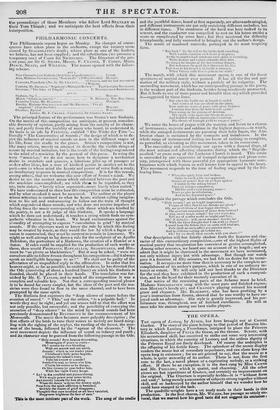THE SECTION OF THIMBLERIGGERS.
No effort has been spared to mystify the nature of the contest now waging between the Reformers and the Tories. But the People have proved themselves to be not quite so stupid as certain trading politicians hoped to find them. They understand the dif- ference between those Members of Parliament who vote against the Tory Ministers, and those who vote with them, perfectly well ; and they do not comprehend how the latter can have any right to the name of Reformers. Men may assume hny designation they please, and for a time may succeed in passing themselves off for 'what they are not; but in a country where the Press is free and vigilant, the deception cannot long be carried on.
It would be well for the Waverers and the " Shabbies " in the present House of Commons to keep this in view. As surely as They turn traitors to the principles the avowal of which gained them the support of the Reformers, shall they be stripped of their false colours, and exposed to the derision and rebuke of their consti- tuents and the country. It does not in the least detract from the political guilt and meanness of their conduct, that they can muster in a tolerably strong body ; while that very circumstance, since it gives them the power to be mischievous, should stimulate their constituents to call them to account for their shuffling.
We know perfectly well the kind of defence which these Rats and Trimmers will set up. They pretend to be Independent par excellence—members of no party, but single-minded Representa- tives of the People. This is the old trick ; which, however, never yet saved them from exposure and subsequent punishment. A Specimen of the style they affect may be found in a letter from Sir ANDREW AGNEW to one of his constituents, published in a Glasgow paper. Sir ANDREW endeavours to justify his intention
of voting for Sir CHARLES SUTTON, although he admits him to be an Ultm.Tory, on the ground of his superior experience, and because Sir ANDREW is no party man. He then proceeds to argue against the propriety of joining any party, after this fashion.
I have been led to reflect much on the limited powers of party politicians— seeing that statesmen, who have shown great abilities in one order of thine, have proved themselves incompetent for the conduct of affairs under altered cir- cumstances. So limited are the powers of such human instruments! In our own time, we have seen a Minister who, during the war, conducted his party in the House of Commons with much energy of mind ; but when most triumphant, when peace was obtained, his past experience being no longer of any avail, under the difficulties of altered eireunistances, he broke down both in body and mind. The repeal of Roman Catholic disabilities having become unavoidable, it was carried by another Prime Minister, who exercised an influence over both Houses of the Legislature, which it was, at the time, admitted no other man could wield. Yet altered circumstances having arisen thereupon, the same Priine Minister could not (or would not) undertake another question which bad be- come inevitable, namely, Civil Reform. He had, therefore, to give place to an Administration who triumphantly carried the great measure of Civil Reform; the which last, by making a prodigious alteration in the circumstances of the country, irresistibly led the way to the consideration of Church Reform ; the under-working of which question occasioned nearly all the difficulties of the last session of Parliament. Yet for the carrying of Church Reform the late Government found itself powerless. . . . Admitting, for the sake of argu- ment, that party politics are necessary ; but considering them but as instru- ments for effecting each correction of evil, and for promoting each salutary re- form which, in God's good Providence, becomes necessarily essential to the welfare of the State ; and seeing that when one party has fretted its 'hour on the stage,' it gives place to other actors qualified for the new performance, but whose performance, however effective, is limited in duration,--thus impressed, it is impossible to affect a party zeal which I do not experience."
The conclusion which a straightforward person, uninitiated in the cant of the class, would naturally come to after reading these re- marks, would be, that the writer intended to stand aloof from both parties. But no such thing—mark what follows.
" If the newspspers are correct, the Ultras in the House of Commons will be nearly balanced ; while somewhere about one hundred of what are termed Moderate men will have the responsible duty of turning the scale. If it is so, and if the latter are faithful watchmen, the Administration must fall, unless their measures are found beneficial ; and they will give place to others who wilt du the work."
Here the murder is out. Sir ANDREW AGNEW, and the Mem- bers of his stamp, cannot but be aware of their want of weight in Parliament and the country. They feel with deep mortification that they are essentially insignificant ; and therefore they endea- vour—these "Moderate men," haters of party—by banding them- selves together, taking up a doubtful position, and pursuing a tortuous course, to make themselves of consequence. And they succeed when parties are nicely balanced. At other times, they are the most inefficient and insignificant men in Parliament, and are unceremoniously crushed by the more numerous and power- ful sections of the House.
Such a party as we have described can give annoyance, and de mischief; but has rarely an opportunity of performing any real service to the country. No Ministry can rely on its support. When a change of Administration occurs, it may be consulted,. but has little weight ; for it is essential to its existence to vote sometimes with, sometimes against Ministers. Upon great emer- gencies, it is all but powerless. It may sometimes be feared, but is never trusted, always disliked, and generally despised, as it deserves to be. It is impossible that a Ministry should ever be formed out of its ranks. M. DUPIN knows this from long expe- rience. As soon as either of the principal parties—the Ultras, as Sir ANDREW AGNEW calls them—obtains a decided predominance, there is an end of the Tiers Parti.
There is a section of the House of Commons, not a hundred, as. Sir ANDREW states, but counting perhaps half that number, who have elected Lord STANLEY as their leader.* This is the Tiers Patti in the British Parliament. It is composed of what are usually termed Rats and Trimmers; O'CONNELL, on Thursday, proposed to christen them " the Tail ;" but this has become a name of honour, and is therefore inapplicable—we think that "tire Thimbleriggers" would be the more appropriate designa- tion. The original inventor of this vulgar nickname was Lord STANLEY, who generously bestowed it on his former colleagues it however suits himself better than them ; for although the Whig Ministers sometimes displayed a lamentable vacillation on their conduct, with a dash of trickiness, such was not their con- stant practice. But Lord STANLEY is now a Thimblerigger in principle. He will sometimes be found voting one way, some- times another. No one will know where to find him. His im- portance depends entirely on his skipping about from one party to- another. He is nothing if not a Thimblerigger.
The names of the Thimbleriggers will soon be correctly ewer- tamed. It behoves their constituents to keep a jealous eye on their movements till the next dissolution; and then ignominiously to kick them out of their seats. They are blowers of hot and cold—despicable creatures everywhere and always. A hearty Tory, honest and consistent although bigoted, is to be preferred to any one of them, on the same principle that an open enemy is preferable to a treacherous, uncertain friend. It is possible that this party may acquire considerable accessions to its numbers; but we are inclined to think that it will not long hold together. The times are not favourable for shufflers. The " pressure from without" will be brought to bear upon all trimming politicians. The constituencies are not in doubt as to great principles and questions. They are Reforming, or Tory—not Thimblerig. Especial care will be taken to inform the Electors of
• An amusing account of the election, from the Morning Chronicle of yesterday. appears in another column. the proceedings of those Members who follow Lord STANLEY as their Tom Thumb; and we anticipate the best effects from their interposition.




























 Previous page
Previous page